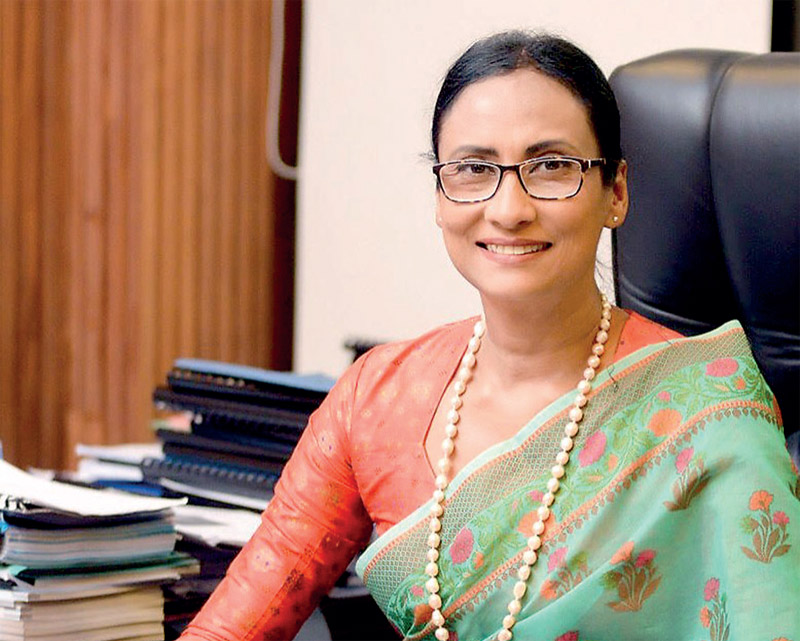Sunday Mar 01, 2026
Sunday Mar 01, 2026
Friday, 30 July 2021 00:02 - - {{hitsCtrl.values.hits}}

Sri Lanka Tourism Chairperson Kimarli Fernando
Tourism is a key source of export revenues and employment for the island and Sri Lanka Tourism recognising the potential for the sector, is focused on developing new products, exploring new markets, and positioning Sri Lanka as the ultimate experiential destination.
The authorities further understand that whilst there are emerging opportunities for growth, it is important to recognise the vulnerability of the sector and strategise on mechanisms to champion resilience and sustainability, with the assistance of global partners such as the World Bank. Sri Lanka’s tourism product is based largely on natural resources, and it would be detrimental to the industry if proper practices and controls are not followed to ensure the sustenance of the sector.
The World Bank Group in collaboration with WebEx Events have designed a series of webinars where World Bank researchers and external panellists discuss tourism resilience and sustainability. The World Bank works with clients, in both the public and private sectors, by providing the latest data, knowledge, and evidence needed to design the most effective guidance and strategies.
Under President Gotabaya Rajapaksa’s manifesto, ‘Vistas of Prosperity’ one of the key policies put forward is the priority on sustainable environmental management. It was recognised that promoting sustainable tourism is a crucial initiative to make Sri Lanka’s tourism business more competitive both locally as well as internationally, and to positively build brand Sri Lanka. Championing this mandate, Sri Lanka Tourism has launched many tactical strategies and long-term initiatives to ensure that Sri Lanka Tourism develops in a sustainable manner. The World Bank Group, New York, recognising the strategic commitment made by Sri Lanka Tourism, invited Sri Lanka Tourism Chairperson Kimarli Fernando to share her learnings and plans.
Kimarli Fernando, who represented Sri Lanka at the webinar shared her thoughts, “The webinar series has provided an excellent platform for sharing the many ambitious plans and numerous changes we’ve made during the last few years. This is especially vital as borders begin to open and the industry braces itself to welcome visitors who will want more than ever to give back to the communities they visit while minimising their travel footprint. Showcasing the island as a unique, experiential destination as opposed to a mass-market destination, is essential for attracting visitors from around the world.
“Representing Sri Lanka authentically and educating a global audience on the country’s many diverse facets is an essential part of our strategy for growth. This corresponds to our policy efforts in terms of new product development and promotions, while also helping us forge new partnerships in important source markets while liaising with existing affiliates.”
Fernando further went on to state, “Sri Lanka Tourism has taken tactical initiatives such as championing of the green building concept for all new tourism developments which will be made mandatory from next year, introducing GSTC accreditation – the global standard for sustainable travel and tourism, a ban on single use plastics and the initiation of the National Sustainable Tourism Certification.
“On a strategic level, we have plans to develop a sustainability roadmap and appoint a special think tank unit to drive this initiative. We invite the World Bank Group and the International community to assist us in our vision to further develop Sri Lanka as a sustainable destination.”
This, the third edition from the series, had a roundtable comprising several illustrious speakers. In addition to Kimarli Fernando, Linnaeus University Professor of Tourism Research and Lund University Human Ecology Stefan Gössling, and Iberostar Group Global Director of Sustainability Office Megan Morikawa, took part in the webinar discussion.
Sri Lanka Tourism understands that commitment to sustainability is essential, as Sri Lanka looks to transform itself into an inclusive and immersive destination. This objective goes in lockstep with the country’s overall vision of creating opportunity and achieving financial success while sustaining the local tourism industry.